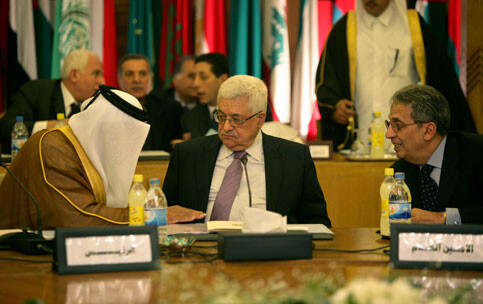The Electronic Intifada 9 April 2010

Arab states should give Israel a choice — respect international law or continue its racist policies in isolation. (Thaer Ganaim/MaanImages)
As more people recognize that the “peace process” has come to an unbridgeable impasse, there is debate. Some, especially those who prospered from the path of failed negotiations, argue that there is no alternative to continuing with the US-brokered “peace process.” Others intimate that a third intifada might be the solution and there have even been warnings of regional war. Others still suggest the Arab states should withdraw their eight-year old Arab Peace Initiative.
Neither war, nor an intifada — in the sense of a violent Palestinian response to Israel’s unrelenting violent aggression — are the only alternatives. Fatah leader Mahmoud Abbas, recognized by foreign powers as the head of the Palestinian Authority, has constantly expressed strong opposition to any armed resistance against the occupier, and has frequently condemned and ridiculed resistance. And, after ignoring them for years, Abbas and his colleagues have lately started to endorse and even associate themselves with the nonviolent struggle of Palestinians in the West Bank, which are always met with Israeli aggression and brutality.
This however is not the only kind of nonviolence I see as a possible alternative: there is also a political option. It is important to recognize first that all efforts to settle the century-old conflict caused by the Zionist invasion of Palestine have failed because they were unjust, arbitrary, distant from legality, and did nothing to right fundamental wrongs.
A new political strategy would involve recognizing this basic shortcoming and demand a return to legality, in effect a return to the days before the 1991 Madrid Conference which launched the past two decades of futile “negotiations” and accelerated Israeli colonization.
The Arab States, including the Palestinians, could demand full implementation of Security Council Resolution 242 in the same manner as it was implemented on the Egyptian side leading to the total evacuation of all the Egyptian occupied territories including the removal of all illegally-built settlements on Egyptian soil. This significant precedent should apply to Syria’s occupied lands as well.
All the dubious formulas of Oslo, the Quartet, the Roadmap, Annapolis and the many other understandings should be dropped. The two-state solution should be dropped, too. Once the occupation ends and the Palestinians recover their territory they have the right then to establish their state on it independently from any Israeli or other foreign intervention. A Palestinian state on part of their historic homeland is not an Israeli gift. It is a right Palestinians alone can decide to exercise, if they so choose.
The Arab states should insist on a comprehensive deal ending the struggle along such lines in its entirety. What applied to Sinai should exactly apply to the Syrian Golan Heights the West Bank including Jerusalem as the situation exactly was before the Israeli invasion on 5 June 1967. And as all Israeli settlements were removed from Sinai and Gaza they should be removed from the West Bank and the Golan Heights if international law is to be applied.
The Arab States should not withdraw their peace offer. They should only amend it in accordance with the exact requirements of international law. They should not declare war on Israel but they should instead unite in demanding international justice in the United Nations — not the Quartet — in accordance with the relevant United Nations resolutions. They should not negotiate with Israel except through the United Nations apparatus. They should suspend any dealings with Israel until Israel complies with international legality and until justice is realized.
The same should apply to the issue of Palestinian refugees, whom Israel bars from returning home in defiance of international law, justice and common practice because of its totally illegal and immoral position that they are not Jews. International law does not permit such blatant racist discrimination, and Arabs are within their rights to demand it end in accordance with the law.
Under the prevailing circumstances all this may sound unrealistic. Perhaps so, but it seems that achieving Palestinian rights via the path of endless, unprincipled negotiations, or working with the occupation itself, has proven even more unrealistic and counterproductive. If the total closure of the road towards peace is not going to turn into uncontrollable violence this should be seriously considered.
Continuing to negotiate with no purpose and no hope of progress with an intransigent Israel only leads to the degradation of the Palestinian and consequently Arab standing and dignity. It also provides a convenient cover for continued Israeli colonization and judaization of Palestinian and Arab lands.
It is high time to admit that the peace process is dead; that Israel has so far manipulated it to consolidate the gains of its aggression; that exploiting Palestinian weakness and official Arab incompetence can only deepen the mistrust and the radicalization of Arab masses; and that the continued neutralization of the UN system is a recipe for growing violence and terror worldwide.
Arabs should offer Israel a choice of either becoming part of the region by respecting international law and implementing UN resolutions — which would also guarantee whatever legitimate rights and concerns Israelis have — or continuing in isolation if it chooses rejection, racism and intransigence.
Of course such Arab positions would be labeled as “radical” and “hard line.” The answer to that is simple: it is Israel’s insistence on its racist character and its defiance of the law that is radical, hardline and aggressive. Palestinian and Arab insistence on the implementation of UN resolutions that reflect a world consensus and universal rights could not be more moderate or reasonable.
Hasan Abu Nimah is the former permanent representative of Jordan at the United Nations. This essay first appeared in The Jordan Times and is republished with the author’s permission.




